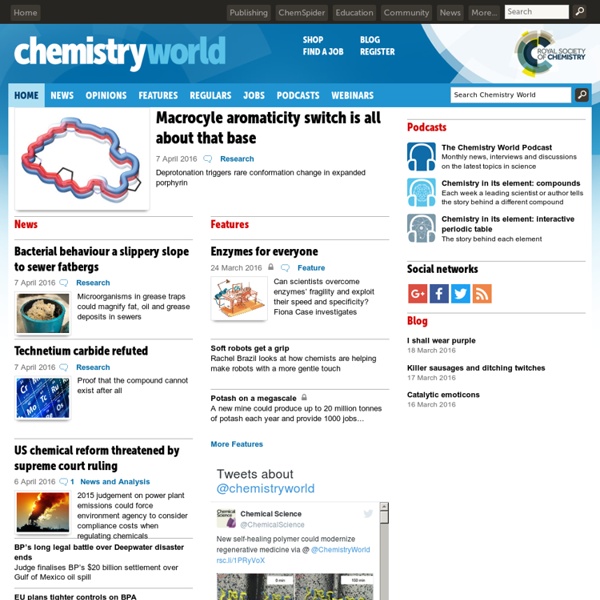



http://www.rsc.org/chemistryworld/
Related: jfarrus • newsFood Safety Small processors face hit from hygiene charges 11-Apr-2014 - Small food processors would pay for hygiene inspections under proposed EU rules after seeming exempt, and time is running out to block this, according to Bob Salmon, director, Food Solutions. Food safety conference to arm delegates with key advice 04-Apr-2014 - Arming manufacturers with the key information they need to manage food and drink safety risks is the aim of the Food Manufacture Group’s one-day conference – Safe and legal food in a changing world – due to take place on Wednesday, October 15 2014, at the Heritage Motor Centre in Gaydon, Warwickshire. Foodex 2014
Public Library of Science: Open Access The Case for Open Access Open Access (OA) stands for unrestricted access and unrestricted reuse. Here’s why that matters. Most publishers own the rights to the articles in their journals. Anyone who wants to read the articles must pay to access them. Anyone who wants to use the articles in any way must obtain permission from the publisher and is often required to pay an additional fee.
hotonthweb April 22, 2014 China / Hot Issues China's police chief stresses Xinjiang stability Chinese Minister of Public Security Guo Shengkun has called for improved combat ability and precautionary measures to fight terrorism to ensure sustained social stability in Xinjiang Uygur Autonomous Region in northwest China. PLoS Biology : Publishing science, accelerating research A Peer-Reviewed, Open Access Journal Current Issue PLOS Biology is a peer-reviewed, open-access journal featuring research articles of exceptional significance in all areas of biological science, from molecules to ecosystems. Global Fresh Produce and Banana News In EasterTurkish peppers with residues destroyed at Bulgarian border Turkish producers once again exported peppers to the European Union that did not meet the EU's phytosanitary requirements. Last Thursday, Bulgaria blocked and destroyed a shipment of Turkish peppers for this reason.The pepper batch in question contained, according to analyses conducted on 17 April, 2.55..... Canadian food inspection agencyNo detectable pathogens for 99.9% of leafy green vegetables tested As part of the Canadian Food Inspection Agency's (CFIA) routine testing of various food products, a survey released today found that more than 99.9 per cent of leafy green vegetable samples had no detectable levels of bacterial pathogens and were safe to consume.As part of a five-year microbiological plan..... China: Imported food will soon have "Black List" warnings Regulations on imported foods will now be stricter.
Accelerating Future There isn’t enough in the world. Not enough wealth to go around, not enough space in cities, not enough medicine, not enough intelligence or wisdom. Not enough genuine fun or excitement. Terrestrial Animal Health Saudi Arabia's King Abdullah sacked the country's health minister on Monday amid a spike in deaths and infections from the virus known as the Middle East respiratory syndrome, or MERS. A royal order carried by the state news agency said Abdullah al-Rabiah was relieved of his post as health minister, and that Labor Minister Adel Faqih would temporarily lead the Health Ministry until a replacement is named. The statement said al-Rabiah will now serve as an adviser to the Royal Court. No reasons were given for the move, but it comes as the kingdom is scrambling to contain the spread of the coronavirus related to SARS.
Media Releases & Bulletins Manitoba’s Lake Fisheries Need Improving - November 9, 2015 Emerging Issues Bulletin – November 2015 Canadians deserve to know if genetically modified salmon is masquerading as Atlantic salmon – October 30, 2015 SeaChoice Discontinues Sustainable Seafood Partnership with Overwaitea Food Group – August 10, 2015 Emerging Issues Bulletin - February 2015 B.C. Science and technology research news « Prev | 1 | 2 | 3 | 4 | 5 | 6 | 7 | 8 | 9 | 10 | Next » Detecting corrosion and fatigue during service A new project, CORFAT (Cost effective corrosion and fatigue monitoring for transport products SCP7-GA-2008-218637), looks to develop new monitoring technology based on acoustic emission testing (AT) combined with follow-up NDT (non-destructive testing) to detect defects such as corrosion or cracks in the structure of surface transport products (ships, railway tank cars, road tankers).
44 tips cards for photographers to cut out and keep or browse on your phone! Digital Camera magazine has been putting pop-out tips cards on its covers for dozens of issues (find out how to subscribe below), so we thought why not put our favorites online? We've picked out a selection of cards to keep you busy during the coronavirus crisis, and they include camera theory, tips for portraits and people shots, ideas for things to photograph in the garden and little projects you can tackle at home. They've been sized specially for easy on-screen viewing, and not just on a desktop computer but on the smaller screen of a tablet or a smartphone. And if you can't easily read the text on your phone, just turn it sideways. For those who prefer paper to pixels, see our diagram below.